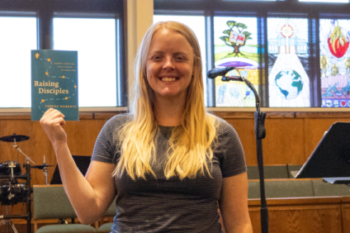Giving from Grief: A Review of LeRoy Lawson’s Son, We Need to Talk
This book review talks about the death of a family member due to mental illness. If you or someone you know are struggling with mental illness or suicidal thoughts, help is available.
My very first funeral as a minister was for a neighbor who decided to end his life by hanging himself in the shed our apartments shared. I wish I had a book like LeRoy Lawson’s “Son, We Need To Talk”: Coping with My Son’s Suicide to help guide me through processing suicide and ministering to the wife, son, daughter, and granddaughter left in the wake. Lawson’s book was published earlier this year by Cascade Books, and it is Lawson’s reflection on and response to his son, Lane, who died by suicide nearly 30 years ago. I thought that I knew this story; I had heard Lawson preach on it. But it wasn’t until reading this book that I realized just what he was and is still going through.
Son, We Need To Talk begins with Lane’s suicide letter from May 1994. Despite knowing people who have been affected by suicide, I have never read a suicide note before. My familiarity with them comes only from books, television, or imagination. I know that people write them, but I’ve never seen one. By including this note, Lawson offers a gift to all his readers. Suicide notes are incredibly personal, and suicide is often a taboo subject, spoken in hushed tones with shame. And yet, Lawson lets us see Lane’s pain for ourselves. Attentive readers will allow this note from Lane to soften their hearts for all who choose this path, as they see and hear a pain that they cannot understand.
Just when we think that reading Lane’s suicide note will be the hardest part of the book, Lawson does what feels unthinkable. He responds to the letter point by point for everyone to see. He takes Lane’s criticisms without argument when they are valid and pushes back gently where he sees an issue differently, as if Lane were still a child sitting on his lap in the study. This is where the name of the book originates: from the kinds of talks most parents have with their children. The response to the suicide note is Lawson’s way of handling his wish that he had reached out to Lane when he knew something was wrong. The response to Lane is so helpful because it shows how hard dealing with suicide really is. There are no neat and tidy answers. Neither a professor of humanities who teaches people what it means to be human, nor a pastor helping people find hope in a God who calls them beloved, nor a father who loves his children dearly, has an easy answer. Lawson is all three of these: a professor, a pastor, and a father. And so, we are reminded to show grace and to comfort those who mourn, because they feel guilt and pain, but there is no simple answer or solution.
The response to Lane is so helpful because it shows how hard dealing with suicide really is. There are no neat and tidy answers.
The book’s final section contains Lawson’s reflections on life before, during, and since that fateful period of his family’s life. The “Reflections” section of Lawson’s book proves to be the most applicable. In it, Lawson reflects on his calling as a minister and professor and how that impacted his family’s life. We read about his mistakes, regrets, and favorite memories as a dad, and he ponders what life might have been like had Lane been alive. We are led to reflect on our own hardships and how we might live out our calling. The most touching parts of the book, but especially in this section, are the family pictures that his wife, Joy, picked to correspond with the memories.
Lawson often refers to the “Lawson family illness” which seems to be some mixture of depression, anxiety, physical problems, and spiritual doubt. I appreciate this wording because it’s a subtle way for him to speak plainly to those close to him—you know what I mean, family—without revealing too much to everyone else. It also helps keep anyone from thinking that suicide is the result of any one thing. If Lawson called it depression or disease or doubt, the echoes from the edge would come: “Well you could have…” “Did you think to try…?” Without a specific description, no such unwanted advice can come. We are left to mourn with him and others. We are not allowed to solve this problem because it is not for us to solve. Lane is gone. The answer to grief is not to wish for what cannot be; it is to be honest with how we feel.
For those of us who know Roy Lawson closely, it can be jarring to read his words. We see him “wander” through life; we hear a preacher reflect on how hard it was to be honest with his feelings, his hopes, and his calling. I am reminded of C.S. Lewis’ A Grief Observed. When I first read that book, I was shocked to see a pillar of Christian thought saying and thinking what he wrote. And Son We Need to Talk was even harder, because Lawson is not just a pillar of Christian thought, he is my friend, my mentor. And here is the real power in his book: we all deal with grief, and the power of grace is that it is sufficient for all of us (2 Cor 12:9). Lawson gifts us his grief to remind us that God is with us.
And here is the real power in his book: we all deal with grief, and the power of grace is that it is sufficient for all of us (2 Cor 12:9). Lawson gifts us his grief to remind us that God is with us.
I have one quibble with this book, and I am hesitant to even write the words. After I performed that funeral for my neighbor, I got involved with a Local NAMI (National Alliance on Mental Illness) chapter and through one of their programs was informed that it was no longer recommended to talk about “committing” suicide. Instead, it is better to use the phrases “death by suicide” or “died by suicide.” The language of “committing” comes from a time when suicide was illegal and it still carries those connotations. Lawson admits that this book is 29 years in the writing, and when Lane died, it was still the only language we had, so he uses it throughout. Yet for pastoral care today, it is worth changing the language around suicide for the benefit of those who have died and their communities.
Nevertheless, Lawson’s vulnerability with all who pick up this book is valuable. I wish I had this book when I was just starting out: every minister will deal with this somehow. I wish I had this book years ago to give my neighbor’s family as a comfort: your feelings are justified. I wish my friend didn’t have the story to write, but for his sake, my sake, and the sake of all people affected by suicide, I sure am glad he did.
Adam Tomlinson is an alum of Emmanuel Christian Seminary at Milligan. View Emmanuel’s Academic Programs page here.





